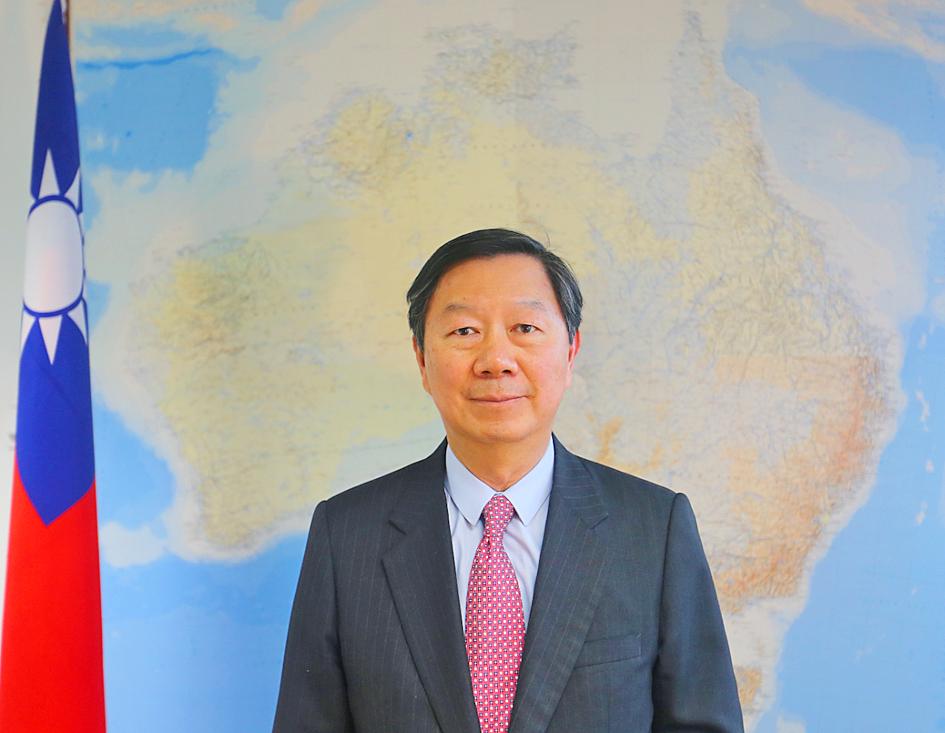A Taiwanese official has asked Australia to support its bid to join the Comprehensive and Progressive Agreement for Trans-Pacific Partnership (CPTPP) pact, saying Taiwan can boost high-technology trade flows and demand for Australian minerals.
Support for Taiwan’s bid would also “send a strong message” to Australian businesses affected by China’s boycotts of Australian products, Representative to Australia Elliott Charng (常以立) yesterday told a parliamentary committee in Canberra.
“Economic sanctions imposed on Australia by China reinforce the argument of engaging with Taiwan more closely and more deeply,” he told the committee.

Photo courtesy of Taipei Economic and Cultural Office in Australia
Each member of the 11-nation CPTPP has to approve new members and the committee will recommend Australia’s response.
The regional trade group, formed in 2018, includes Canada, Australia, Brunei, Chile, Japan, Malaysia, Mexico, New Zealand, Peru, Singapore and Vietnam. It has received applications from Britain, Taiwan and China to join. The bids by Taiwan and China in the past month have sparked tension, with Beijing opposing Taiwan’s application, and Taiwan accusing Beijing of bullying.
China is Australia’s largest trading partner, with exports reaching a record A$19.4 billion (US$14.3 billion) in July on the back of iron ore demand. However, diplomatic relations have soured in recent years.
Australia was Taiwan’s third-largest source of agricultural goods, worth US$607 million last year, and the CPTPP would provide structure to do business and enhance cybersecurity cooperation, Charng said.
“The opposition from China is not unexpected. China will use every way to avoid Taiwan participating in any international organizations,” he said.
China on Monday said it had lodged stern representations with Australia over “inappropriate” comments by former Australian prime minister Tony Abbott who last week visited Taiwan in a personal capacity and met Taiwanese President Tsai Ing-wen (蔡英文).
Abbott told reporters on Friday that Taiwan met the criteria for joining the CPTPP, but “fear of upsetting China” could cause some members to object to Taiwan’s application.
He urged countries to move beyond “rhetorical support” for Taiwan and provide practical support.
China has also lobbied the Australian parliament committee to help it join the CPTPP, describing the strength of Chinese trade with Australia and avoiding mention of billions of dollars in punitive sanctions imposed by Beijing.

NEW IDENTITY: Known for its software, India has expanded into hardware, with its semiconductor industry growing from US$38bn in 2023 to US$45bn to US$50bn India on Saturday inaugurated its first semiconductor assembly and test facility, a milestone in the government’s push to reduce dependence on foreign chipmakers and stake a claim in a sector dominated by China. Indian Prime Minister Narendra Modi opened US firm Micron Technology Inc’s semiconductor assembly, test and packaging unit in his home state of Gujarat, hailing the “dawn of a new era” for India’s technology ambitions. “When young Indians look back in the future, they will see this decade as the turning point in our tech future,” Modi told the event, which was broadcast on his YouTube channel. The plant would convert

‘SEISMIC SHIFT’: The researcher forecast there would be about 1.1 billion mobile shipments this year, down from 1.26 billion the prior year and erasing years of gains The global smartphone market is expected to contract 12.9 percent this year due to the unprecedented memorychip shortage, marking “a crisis like no other,” researcher International Data Corp (IDC) said. The new forecast, a dramatic revision down from earlier estimates, gives the latest accounting of the ongoing memory crunch that is affecting every corner of the electronics industry. The demand for advanced memory to power artificial intelligence (AI) tasks has drained global supply until well into next year and jeopardizes the business model of many smartphone makers. IDC forecast about 1.1 billion mobile shipments this year, down from 1.26 billion the prior

People stand in a Pokemon store in Tokyo on Thursday. One of the world highest-grossing franchises is celebrated its 30th anniversary yesterday.

Zimbabwe’s ban on raw lithium exports is forcing Chinese miners to rethink their strategy, speeding up plans to process the metal locally instead of shipping it to China’s vast rechargeable battery industry. The country is Africa’s largest lithium producer and has one of the world’s largest reserves, according to the US Geological Survey (USGS). Zimbabwe already banned the export of lithium ore in 2022 and last year announced it would halt exports of lithium concentrates from January next year. However, on Wednesday it imposed the ban with immediate effect, leaving unclear what the lithium mining sector would do in the